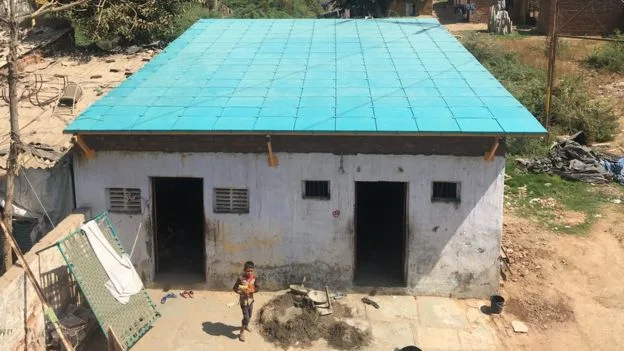"You go into slums and villages and it is a problem-rich environment."
Hasit Ganatra saw people in the slums of Ahmedabad in Gujarat, India, and realised that their lives were blighted by the quality of their homes.
Around 65 million people across India live in slums, according to data from the 2011 census, which defines a slum as "a residential area where houses are unfit for human habitation".
"You look at the roof, it has all these holes and you ask them: what's going on? And they say we have no other option," says Mr Ganatra.
The houses are commonly made of tin or concrete, so residents can find them too hot in summer, freezing in winter, and open to the rain during monsoon season.
An engineering graduate who had returned to his home town, Mr Ganatra decided that there must be a better way to construct roofs. A sustainable and cost effective way, that would allow residents to be comfortable in their homes.
Bad conditions
It took two years and more than 300 attempts, but finally Mr Ganatra and his company, Modroof, designed modular roof panels made from waste, pulped cardboard and natural fibres that were both sturdy and waterproof.
"Worldwide experts told us to give up; they said we'd never do it," he says.
"But when you see this sort of problem [in the slums] you have to do something about it."
Modroof has an all-women sales team, many of whom were customers themselves and are keen to spread the word about how much difference a new roof can make to the quality of life for women and children who spend a lot of time at home.
Saleswoman Kushalya Shamra says it's all about giving residents a better life.
"When we go to people's houses I feel very bad that they live in such bad conditions," she says.
"We tell them this roof is easy to maintain. We can help them get loans, as many are from poor backgrounds."

- Can these ice stupas solve the water crisis in the Himalayan Desert?
- The shampoo bottle saving babies
- Can these beads solve the biggest mass poisoning in history?
- Could this 10-year-old help fix Pakistan's waste problem?
- How solar-powered suitcases are helping babies in Nepal
- Building toilets with poo power
- 'Everything can be solved by innovation'
The BBC's Innovators series reveals innovative solutions to major challenges across South Asia.
Learn more about BBC Innovators.
An average 250 sq ft (23 sq m) roof costs $1,000 (£760) - more expensive than a roof made from metal sheeting but cheaper than concrete slabs.
Half of Modroof's customers use microfinance loans to spread the cost, paying around $50 a month over two years.
"We have four small kids at home and the kind of roof we have becomes very hot in the heat wave," explains Sakina, who wants the Modroof team to start as soon as possible on the construction of a new roof for her home.
"It affects the children, they haven't been well for over a month."
Global crisis
Indian Prime Minister Narendra Modi has vowed to eradicate slum dwellings. The government has a programme to build 20 million affordable homes in urban areas by 2020.
In the meantime, organisations like the Centre for Urban and Regional Excellence (Cure) are working to improve existing slum housing.
"Bad roofing is one of the critical pieces of good housing, so if you want to do good housing for people then roofing innovation is one of the elements that we need to look at closely," says Cure director Rhenu Chosla.
Many people in Ahmedabad use their roof for more than just covering their house. Sanjay Patel runs a local school and says the new roof has allowed his pupils to have more time outdoors.
"Children can go up and fly a kite or can even sleep on it. The tin roof we had before was useless and we found it dangerous to send children out on to it," he says.
Worldwide interest
"We have people from all over the world who ask us about the panels. [Poor housing] is a global crisis. In my mind, it's a global crisis," says Mr Ganatra.
The Modroof panels are designed to last 20 years and he hopes that over this period many more houses in slums across India will make use of his invention.

















